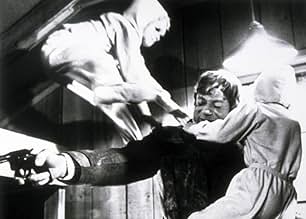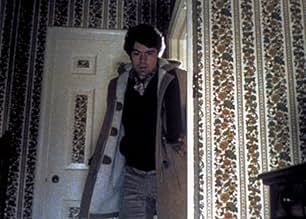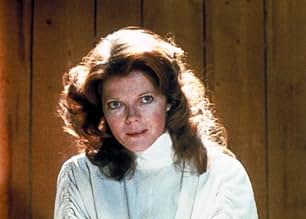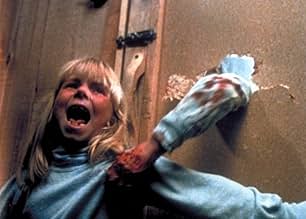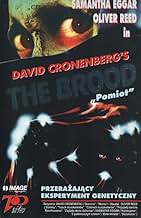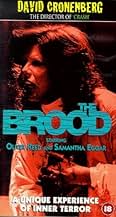AVALIAÇÃO DA IMDb
6,8/10
37 mil
SUA AVALIAÇÃO
Um homem tenta descobrir as técnicas terapêuticas de um psicólogo não convencional no meio de uma série de assassinatos brutais.Um homem tenta descobrir as técnicas terapêuticas de um psicólogo não convencional no meio de uma série de assassinatos brutais.Um homem tenta descobrir as técnicas terapêuticas de um psicólogo não convencional no meio de uma série de assassinatos brutais.
- Prêmios
- 1 vitória e 5 indicações no total
Robert A. Silverman
- Jan Hartog
- (as Robert Silverman)
Avaliações em destaque
One of Cronenberg's best films! It has some moments that will stick with you for a while. When the brood first appears and the beatings begin, I was not only disturbed by them, but the way that their faces look was burned onto my brain. I once read that Cronenberg calls this film his KRAMER VS. KRAMER. I think that's very interesting. He's taken the pain that he went through in his own life and manifested it in the physical form of these creatures. I find this kind of creativity to be associated only with some of the more visionary contemporary filmmakers. Cronenberg is that, there is no question. Performances by the late great Oliver Reed, Samantha Eggar and Art Hindle are perfect for the film. It is scary and disturbing and should be seen by all horror film fans. I find it to be a sadly neglected classic.
Although I have watched David Cronenberg's "The Brood" a number of times, I still find it unbelievably disturbing. From the beginning until the ending credits, it is unsettling horror at its morbid best.
Under the care of Dr. Hal Raglan (Oliver Reed), Nola Carveth (Samantha Eggar) is undergoing a radical and controversial form of psychiatric treatment called "Psychoplasmics". Psychoplasmics takes the role-playing of psychotherapy to a new level by training the patient to release his pent-up rage and physically expel that rage from his body. Sounds weird? That is only the beginning. Frank Carveth (Art Hindle) is Nola's estranged husband who suspects his wife of physically abusing their daughter Candace. After vowing to protect his daughter legally, murders committed by strange deformed children begin to occur.
To say anymore would be to stifle The Brood's terror-ific mystique. However, I will suggest that you consider experiencing this film on an empty stomach with the lights on. After viewing, don't be surprised if you feel compelled to make amends with anyone you might currently be at odds with.
Under the care of Dr. Hal Raglan (Oliver Reed), Nola Carveth (Samantha Eggar) is undergoing a radical and controversial form of psychiatric treatment called "Psychoplasmics". Psychoplasmics takes the role-playing of psychotherapy to a new level by training the patient to release his pent-up rage and physically expel that rage from his body. Sounds weird? That is only the beginning. Frank Carveth (Art Hindle) is Nola's estranged husband who suspects his wife of physically abusing their daughter Candace. After vowing to protect his daughter legally, murders committed by strange deformed children begin to occur.
To say anymore would be to stifle The Brood's terror-ific mystique. However, I will suggest that you consider experiencing this film on an empty stomach with the lights on. After viewing, don't be surprised if you feel compelled to make amends with anyone you might currently be at odds with.
The Brood is undoubtedly the most personal movie Cronenberg ever made : we all know the film describes Cronenberg's vision of his own divorce (and the custody of his daughter Cassandra) ; at that time, his then-wife belonged to what he thought was a cult and he did kidnap his own daughter in order to protect her. Thus The Brood is full of rage, vengeance and death wish
It is a truly frightening story and, in its own way, a candid vision of one's personal tragedy. It seems to be a tale from the Grimm brothers, and, at the same time, a reflection on the powerful link between body and spirit. The script is surprisingly complex and rich, even if, in the end, there is definitely something childish in the movie, but in a positive way: the childish belief that "thoughts can kill" only tempered by the final sequence, when we understand that this little girl, so cruelly abused, will eventually reproduce what her mother developed. The image of this mother (Samantha Eggar at her best, revealing her tortured body that evokes a Roman goddess) is one of the most terrifying one in world cinema. The Brood is a key to understand one of the Cronenberg's major themes: the uncanny
How what is closest to us, family, mother, grandparents, might suddenly become the ultimate horror. What frightens us is not outlandish or alien, on the contrary, it's always part of our intimate universe (as in Videodrome).
Huge Cronenberg fan, but I gotta ask if i'm not as "disturbed" by this movie as everyone else, what does that say about me? I gotta be real, it was pretty boring. Then when it became "Cronenberg-ish" toward the end, it was sort of too late for me. 10 minutes do not a make a movie, and it was pretty hard for me to stay interested through most of it. The famous scene at the end just doesn't make up for it, sorry. Also it seems people defend it because of the fact that this story mirrored what he was going through in his personal life at the time and is sort of a metaphor with what he went through with his wife. As a movie watcher, I should not care nor have to know about that going into the movie, because it alters your perception of what to expect.
David Cronenberg has always possessed a flair for unique and disturbing visions infused with the trimmings of a genre that can be best referred to as "biohorror." "The Brood," his tale of hideous mutant children who do the bidding of mentally disturbed Nola (Samantha Eggar) under the care of new-wave psychiatrist Dr. Raglan (Oliver Reed, with a quietly sophisticated Peter Cushing sensibility), is buffered by fine performances that veer away from camp. In a way, one of Cronenberg's achievements is writing such outlandish material and making it entirely convincing and visceral, as opposed to merely settling on B-movie cheesiness, which I admire. As is the case with most Cronenberg films, here 'reality' is made the most atypical place where man can reside, and the clever script is always one careful step ahead of the audience.
7/10
7/10
Você sabia?
- CuriosidadesDavid Cronenberg wrote the film following the tumultuous divorce and child-custody battle he waged against Margaret Hindson. Cronenberg also said that Samantha Eggar's character, Nola Carveth, possessed some of the characteristics of his ex-wife.
- Erros de gravaçãoJust after the first murder, the deformed/mutant child who committed it leaves very large, bloody handprints on the stair railing just near the dead body. These handprints are never mentioned again, in particular by the police, who insist later that they were "never looking for anything that small." It would have been impossible to miss these handprints at the crime scene, and such child-sized handprints would have certainly tipped off the police in a different direction upon discovery.
- Citações
Juliana Kelly: Thirty seconds after you're born you have a past and sixty seconds after that you begin to lie to yourself about it.
- Cenas durante ou pós-créditosSpecial thanks to Dr. Denton: Sleepware.
- Versões alternativasThe 2005 R2 UK DVD by Anchor Bay, features the 92min Unrated Cut (in addition to the 88min UK edited cut). This is the first time the Unrated Cut has been released in the UK on a home entertainment format, and includes an additional 28 seconds of footage from the ripping and licking of the foetus, the mallet murder of the old lady and shots of the dead schoolteacher's battered face.
Principais escolhas
Faça login para avaliar e ver a lista de recomendações personalizadas
Detalhes
- Data de lançamento
- País de origem
- Idioma
- Também conhecido como
- Los engendros del diablo
- Locações de filme
- Empresas de produção
- Consulte mais créditos da empresa na IMDbPro
Bilheteria
- Orçamento
- CA$ 1.400.000 (estimativa)
Contribua para esta página
Sugerir uma alteração ou adicionar conteúdo ausente

Principal brecha
By what name was Os Filhos do Medo (1979) officially released in India in English?
Responda

